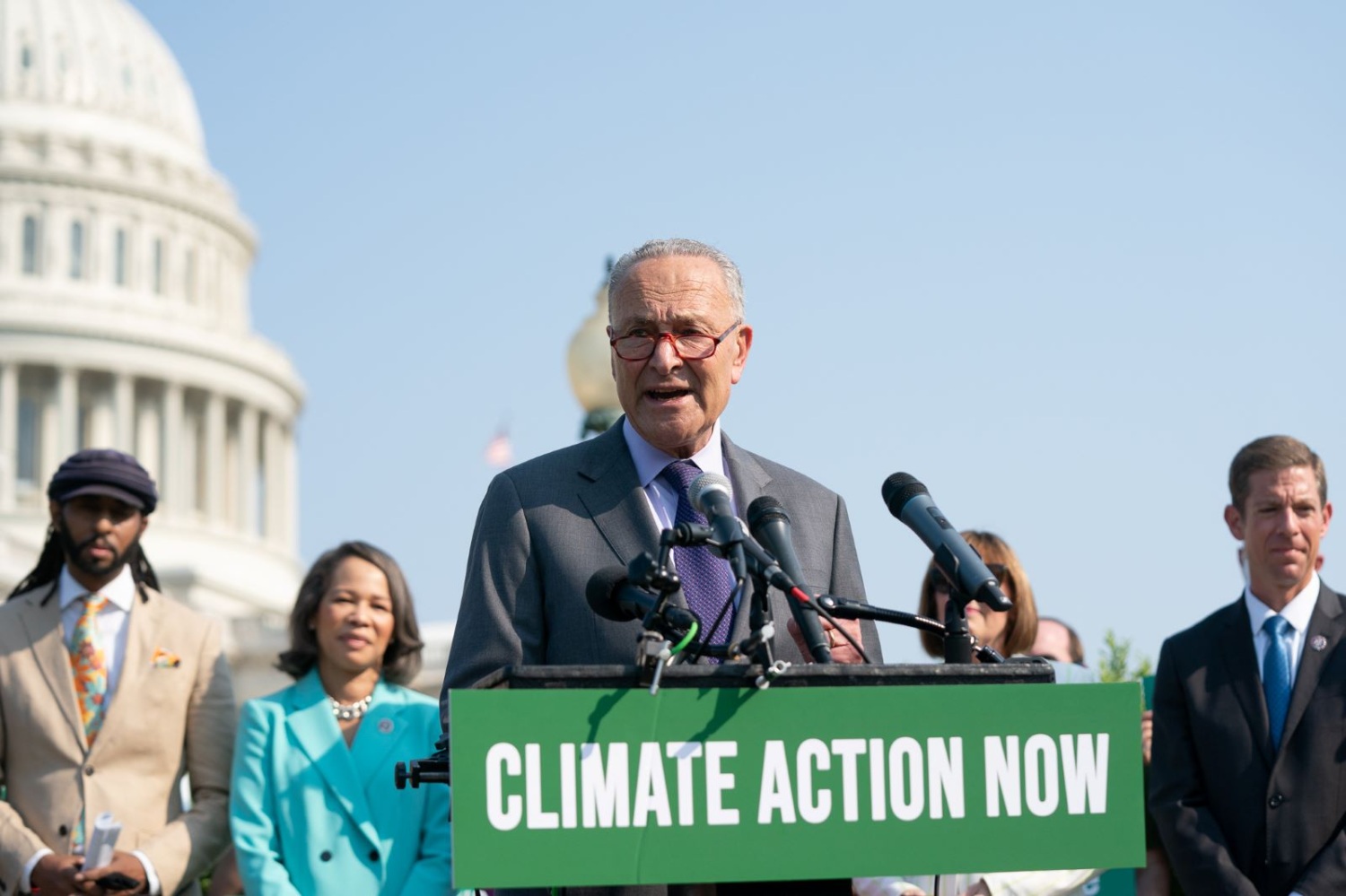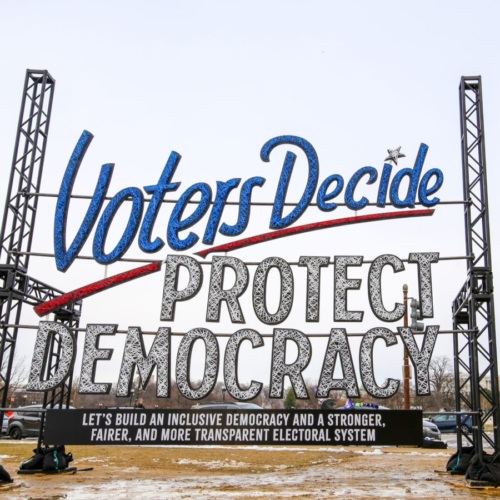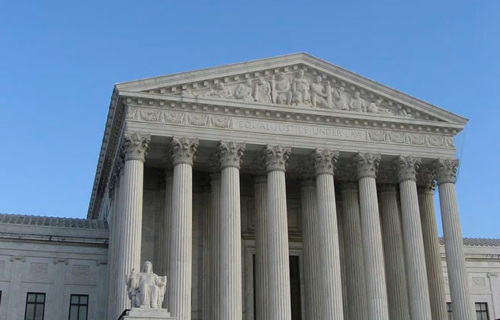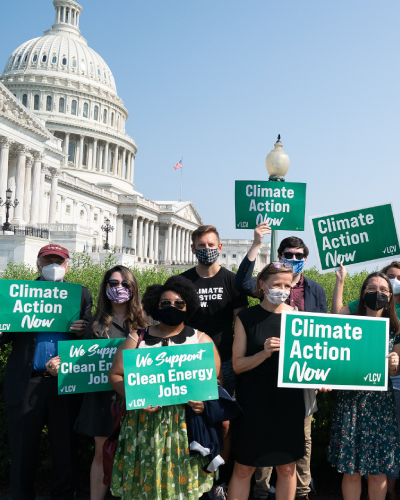
No Kings Rallies Draw Record-Breaking Crowds Protesting Trump’s Assaults on Democracy
Jun 20, 2025

The hottest global temperature ever recorded. An unprecedented series of climate change-fueled disasters. After 2023’s year of extreme weather, it’s more important than ever that our lawmakers in Congress vote to protect our environment, our communities, and our democracy.
To hold our lawmakers accountable, LCV’s annual National Environmental Scorecard tracks the voting records of all members of Congress on critical issues and tallies their overall scores. The scores indicate how well they are voting to protect people and the planet – or if they are voting to protect polluters and special interests instead.
The 2023 National Environmental Scorecard released today tells another story of extremes. Following historic wins for climate action with the Inflation Reduction Act’s passage in 2022, last year climate champions in Congress successfully fought back against a slew of attacks on environmental protections. Meanwhile, the MAGA Republican-led House spent their time infighting, catering to Big Polluters and attempting to undo the Biden-Harris administration’s monumental affordable clean energy plan.
In this article:
The Scorecard provides an overview of these major legislative wins and losses for climate and democracy. To hold every member of Congress accountable, it scores 36 House votes and 16 Senate votes on crucial issues including climate change, environmental and racial justice, clean energy, democracy, public health and more. And for the second year in a row, the report highlights the extraordinary leadership of the Black, Latinx, and Asian American, Native Hawaiian and Pacific Islander (AANHPI) members of the Tri-Caucus – in addition to their Indigenous and other colleagues of color – in fighting for environmental justice and an equitable democracy.
Extreme House Republicans refused to work with the Senate on full year government funding, nearly causing federal government shutdowns and catastrophic national debt default. Unfortunately, the agreement ultimately reached to raise the debt ceiling and avert global financial crisis included anti-environmental riders. The bill gave corporations more influence over the implementation of the National Environmental Policy Act, and forced approval of the methane gas Mountain Valley Pipeline.
House Republicans sought to block clean energy and expand fossil fuel production, passing legislation that would mandate more oil drilling on public lands and gut key provisions of the Inflation Reduction Act. Republican House leadership held at least 31 recorded votes to eliminate clean energy incentives that will help tackle climate change and accelerate the clean energy transition. Learn more: LCV, Climate Power, and the Climate Action Campaign joined forces to track Republicans’ recorded votes to repeal the Biden administration’s landmark climate and clean energy plan and other provisions of the Inflation Reduction Act. LCV’s Hall of Republican Clean Energy Hypocrisy tracks Republicans who, despite voting against the law, are now cheering IRA-funded projects benefiting their constituents.
Republicans in both chambers forced anti-environment votes using the extreme process of the Congressional Review Act (CRA). Passed under Speaker Gingrich’s leadership in the 1990s as a way to undermine the government’s role in setting sensible safeguards, the CRA allows Congress to overturn final Executive Branch rules with a simple majority and prevent the pursuit of any “substantially similar” rules in the future. Historically, this has been abused by lawmakers who want to permanently strip away protections for our environment, communities, wildlife, and natural heritage. The 2023 Scorecard tallies CRAs attempting to block the Biden administration’s progress protecting communities from dirty trucks, endangered species on the edge of survival, and retirement savings from climate risks. Fortunately, these attempts to roll back beneficial rules were vetoed by the President and failed to become law.
The Tri-Caucus, which includes the Congressional Asian Pacific American Caucus, the Congressional Black Caucus, and the Congressional Hispanic Caucus, continued to be a trailblazing force for pro-environment and pro-democracy legislation. Representative Hakeem Jeffries made history with his election as House Democratic Leader, becoming the first Tri-Caucus member to lead a party in either chamber.
The Farm Bill, usually a bipartisan priority, was protected by Democrats against extreme Republicans’ efforts to raid it. Typically passed every five to six years, the Farm Bill is a legislation package that updates federal agricultural, conservation, and food policy. Republicans tried to roll back climate-smart agriculture, conservation, and clean energy program funding that was passed as part of the Inflation Reduction Act. Democrats were united against this effort, and Congress extended expiring programs’ authorizations through the end of 2024. Learn more: The Farm Bill includes critical programs to help farmers update their methods and equipment to cope with the extreme temperatures, drought, and flooding caused by climate change. Read the story of one urban farmer and how these programs help her keep growing for her community.
The Democratic-led Senate approved 69 lifetime federal judge nominations. This bench is historically diverse in personal and professional backgrounds, including experience in environment and democracy issues. In particular, Judges Nancy Abudu and Dale Ho are two top voting rights experts, and Judge Rachel Bloomekatz has deep public interest and environmental litigation experience.
Where did your lawmakers stand on these developments in 2023? Together we can hold members of Congress accountable by thanking and supporting those who scored high marks for voting for people and the planet – and by demanding better from those who protect polluters and special interests.
Through contacting their offices to share your feedback and spreading the word on social media, you can make sure Congress knows their constituents want them to put communities first – and are watching their votes.
Follow @lcvoters to join the conversation on Twitter, Instagram and Facebook.

Every day, new headlines announce state legislation that disenfranchises voters of color across the country. And far-right judges are upholding these restrictive laws. The John R. Lewis Voting Rights Advancement Act would restore and modernize the 1965 Voting Rights Act and block racist laws before they can be enacted. We need voting protections now more than ever. Tell Congress to put an end to racially discriminatory voter suppression once and for all.

Extremist MAGA justices on the Supreme Court have severely limited the federal government’s ability to regulate climate pollution from power plants, stripped Clean Water Act protections from most wetlands, and overturned Roe v. Wade. Now, they’re looking to overturn a bedrock doctrine of the American legal system in order to increase their own power. To protect the people, our planet, and our democracy, we must urge Congress to expand the Supreme Court, shore up its ethical standards, and confirm pro-environment, pro-democracy judges.

LCV supporters believe that ensuring a healthy, safe, and just world for current and future generations should be a top priority for elected leaders. Your membership helps LCV work to make that goal a reality — generating hundreds of thousands of messages to decision makers, flexing our movement’s collective power on Capitol Hill, and defending against attacks on critical environmental and democracy policies.